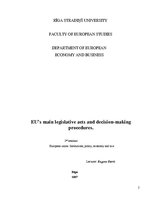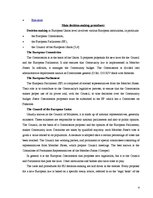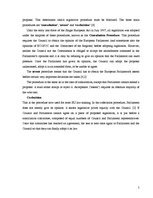Legislation (or "statutory law") is law which has been promulgated (or "enacted") by a legislature or other governing body.[7;1] The term may refer to a single law, or the collective body of enacted law, while "statute" is also used to refer to a single law. Before an item of legislation becomes law it may be known as a bill, which is typically also known as "legislation" while it remains under active consideration.
These are the two main categories of legislation in the UK.
• Primary legislation
• Secondary legislation
‘Primary legislation’ is the general term used to describe the main laws passed by the legislative bodies of the UK.[6;1] The principal examples are:
• Acts of the UK Parliament
• Acts of the pre-UK Parliaments
• Acts of the Scottish Parliament
• Acts of the Northern Ireland Assembly (and other primary legislation for Northern Ireland)
• Church of England Measures (legislation for the established church in England passed by the General Synod of the Church of England)
These types of legislation are sometimes referred to as ‘statutes’. When we speak of ‘the statute book’, we mean the whole of the statute law currently in force. The term ‘primary legislation’ also includes certain legislative instruments made by the Crown under the royal prerogative .
…
Legislation (or "statutory law") is law which has been promulgated (or "enacted") by a legislature or other governing body.[7;1] The term may refer to a single law, or the collective body of enacted law, while "statute" is also used to refer to a single law. Before an item of legislation becomes law it may be known as a bill, which is typically also known as "legislation" while it remains under active consideration. These are the two main categories of legislation in the UK. • Primary legislation • Secondary legislation ‘Primary legislation’ is the general term used to describe the main laws passed by the legislative bodies of the UK.[6;1] The principal examples are: • Acts of the UK Parliament • Acts of the pre-UK Parliaments • Acts of the Scottish Parliament • Acts of the Northern Ireland Assembly (and other primary legislation for Northern Ireland) • Church of England Measures (legislation for the established church in England passed by the General Synod of the Church of England) These types of legislation are sometimes referred to as ‘statutes’. When we speak of ‘the statute book’, we mean the whole of the statute law currently in force. The term ‘primary legislation’ also includes certain legislative instruments made by the Crown under the royal prerogative . ‘Secondary legislation’ (also called ‘subordinate legislation’) is delegated legislation made by a person or body under authority contained in primary legislation.[7;6] Typically, powers to make secondary legislation may be conferred on ministers, on the Crown, or on public bodies. For example, the Office of Communications (OFCOM) is given such powers by the Communications Act 2003.





